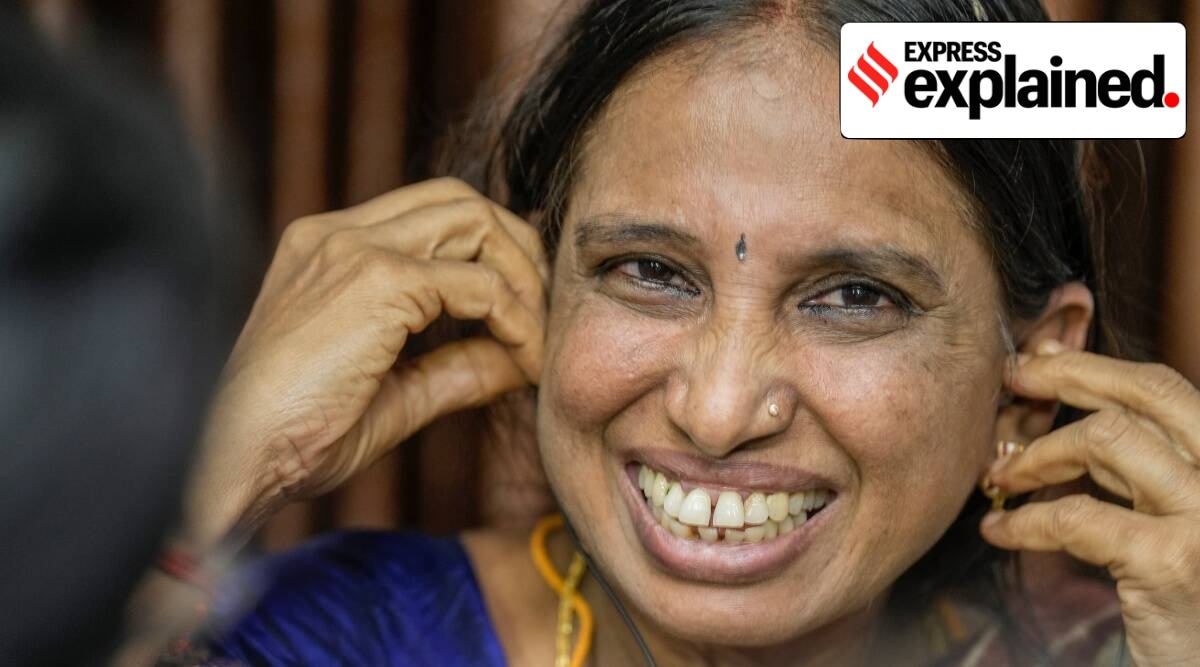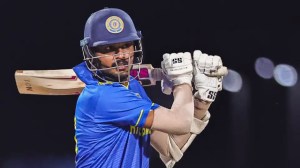The story of Nalini Sriharan, and her role in Rajiv Gandhi’s assassination
Nalini Sriharan has been released by the Supreme Court after serving 31 years in prison in connection with the Rajiv Gandhi assassination case. Who is she, and what was her role in the case? What has she said about the case in her book? What did she tell Priyanka Gandhi when the latter came to meet her?
 Nalini Sriharan, one of the convicts in the Rajiv Gandhi assassination case, during a press conference, a day after she was released from prison. (PTI)
Nalini Sriharan, one of the convicts in the Rajiv Gandhi assassination case, during a press conference, a day after she was released from prison. (PTI)India’s longest-serving woman prisoner, Nalini Sriharan, was one among the six convicts in the 1991 Rajiv Gandhi assassination case whose release was ordered by the Supreme Court on Friday, November 11. She was the only accused present alive at Sriperumbudur when Rajiv Gandhi was killed by an LTTE human bomb on May 21, 1991. As she walked out of jail 31 years later on November 12, here’s a look-back at who is Nalini and what role she played in one of the country’s most controversial cases.
Who is Nalini Sriharan?
A graduate of English language and Literature from Ethiraj College, Nalini Sriharan was working with a private firm in Chennai. She was the eldest of three children born to Padmavathi, a nurse, and P Sankara Narayanan, a police inspector, who died in 2016. Due to marital problems between her parents, her childhood was not happy. Her father left home to live separately when she was a teenager.
Unlike the other convicts in the case, neither Nalini nor her family had any political links. It was her brother Bagyanathan’s camaraderie with some friends that brought Sriharan alias Murugan to her home. Murugan was a member of the Liberation Tigers of Tamil Eelam (LTTE). She later married him.
What’s her role in the Rajiv Gandhi assassination case?
On May 21, 1991, former Prime Minister Rajiv Gandhi was assassinated by an LTTE woman suicide bomber when he was in Sriperumbudur in Tamil Nadu to attend a rally before elections. Dhanu, who was identified as the suicide bomber, went close to Gandhi during the rally and bowed as if to touch his feet, before detonating the bomb she was wearing inside her salwar kameez. Apart from Gandhi, nearly 15 others were killed in the blast, and several were injured.
Nalini’s confession statement, taken under TADA custody, said she hosted two Sri Lankan women, Subha and Dhanu, who carried out the attack. She was also accused of taking them to buy the clothes they wore on the day of the killing, of knowing their plan in advance, and of accompanying them to Rajiv’s election rally.
Nalini traveled by bus with Sivarasan, Subha, Dhanu, and photographer S Haribabu to Sriperumbudur. The charge sheet said Nalini, Subha, and the LTTE mastermind, Sivarasan, fled after Dhanu blew herself up. Haribabu was also an LTTE sympathiser and was hired to document the assassination. It was Haribabu’s camera that showed the involvement of Nalini.
Nalini and Murugan, who remained in hiding for several days after the assassination, were arrested on June 15, 1991, from Chennai Saidapet bus stand. Even though Nalini’s role in the conspiracy was a matter of debate among even the judges of the Supreme Court, her close association with Rajiv’s killers put her at the center of the case. She was pregnant at the time of her arrest.
However, in her autobiographical book, Rajiv Assassination: Hidden truths and the meeting between Nalini and Priyanka, as told to journalist Ekalaivan, translated to English from Tamil, she recounts the incident and says, “We would have walked 200 feet towards the road, and I heard a huge explosion. It was common to welcome leaders by exploding crackers, but this one was leaving the area devastated. I turned back and saw a ball of fire and smoke between the sky and the land. The place was filled with commotion. People were running helter-skelter. I am sure many people would have been hurt in the stampede. I was still clueless over what had happened. After a while Shuba stopped. I was shaking in fear and my throat was parched. I still don’t know what had happened, but I was sure something had gone wrong. People were still running in panic.”
 Nalini Sriharan, one of the convicts in the Rajiv Gandhi assassination case, being released from prison, in Vellore, Saturday, Nov. 12, 2022. (PTI Photo)
Nalini Sriharan, one of the convicts in the Rajiv Gandhi assassination case, being released from prison, in Vellore, Saturday, Nov. 12, 2022. (PTI Photo)
What were the charges against her?
A trial court in 1998 sentenced the 26 accused, including Nalini and Sriharan, to death. In the absence of any of the main conspirators being caught alive, Nalini’s mother Padmavathi and brother Bagyanathan were among those who were sentenced to death by a TADA court in 1998. They were released by the Supreme Court in 1999; however, the court upheld the death sentence against Nalini, Murugan, and five others.
Even though she was convicted under criminal conspiracy and murder (Section 120B of IPC), in her book, Nalini said she was unaware of the assassination plot. An excerpt from the book read: “I told him I was pregnant just before the bomb blast. He was so happy that he lifted me and danced around. We were even discussing names for the baby. If we were involved in a conspiracy to kill a leader of that stature if we were aware of this, would we have been happy about the baby? Could we even be thinking about the future? Could my husband have gone to bed in peace on May 21 after sending me alone to the public meeting?”
“Would any woman go to such a place if she were aware that it could be dangerous for her first pregnancy? I was in the first trimester then. I knew that even a little shock – or long travel – could be dangerous for my pregnancy. My mother has had 25 years of experience as a midwife. I would not have done anything to endanger my pregnancy,” she said.
One of the major accusations against her was that her husband had brainwashed her. In response to that, she said in her book, “From the first time we met, we hardly had any privacy. Our conversations on the days we did meet in privacy were given as confession statements. We never met even once between May 7 and the afternoon of May 21.
“Only once on May 18, we exchanged happiness over my pregnancy. How could he have brainwashed me? There is no evidence to that effect. I think this is enough to establish we are innocent,” she said.
 Nalini Sriharan and V. Sriharan alias Murugan, convicts in the Rajiv Gandhi assassination case, after being released from their prisons, in Vellore, Saturday, Nov. 12, 2022. (PTI Photo)
Nalini Sriharan and V. Sriharan alias Murugan, convicts in the Rajiv Gandhi assassination case, after being released from their prisons, in Vellore, Saturday, Nov. 12, 2022. (PTI Photo)
The Supreme Court’s judgment in 1999
When the case was heard by a three-judge bench in the Supreme Court, they gave separate judgments on the quantum of sentence for the convicts. While the majority in the three-judge SC Bench confirmed the capital punishment for Nalini, Justice K T Thomas dissented.
Citing evidence, Justice KT Thomas observed that Nalini was “an obedient participant” who “realized only at Sriperumbudur that Dhanu was going to kill Rajiv Gandhi”. But she could not have retreated because “she was tucked into the tentacles of the conspiracy”, and knew “Sivarasan and Santhan had liquidated those who did not stand by them,” Justice Thomas wrote.
Both Tamil Nadu High Court and the Supreme Court had, however, found Nalini guilty of having been a willing participant of the assassination plot.
In 2000, Nailini’s death sentence was commuted to life on the intervention of Sonia Gandhi (Rajiv Gandhi’s wife and former Congress president). In 2014, the Supreme Court commuted the death sentences of three others to life and in 2018, the Tamil Nadu government recommended to the Governor that the convicts be released.
Life in prison
Having spent nearly three decades in prison, Nalini in her book talks about the alleged torture she was subjected to while in custody, including harassment and being chained in a room for weeks. She also speaks about the torture she claims to have faced as a pregnant woman at the hands of the police.
“I will never forget the gynecologist who refused to do it, despite the requests of some officials, stating that she would end up killing two lives including mine. To this day, I keep the gynecologist in my prayers,” she wrote.
“My daughter was with me in jail for two years before I decided that her fate shouldn’t end up like this and sent her away with a friend’s mother. An officer threatened that he would push my daughter into sex work, even before she was born. What mistake did she commit? How could I let her be with me in jail?,” an excerpt of the book read.
In prison, she completed an MCA degree, a beautician course certificate, and is a certified tailor and yoga instructor.
In the last 29 years, Nalini has stepped out of the prison only twice — first in 2016, for 12 hours, to attend her father’s funeral and second in July 2019, when she was granted a 51-day parole to make arrangements for her daughter Haritha’s wedding.
On November 27, 2019, Nalini wrote a letter to Prime Minister Narendra Modi, Madras High Court Chief Justice Amreshwar Pratap Sahi, and the Tamil Nadu Home Secretary’s Office, seeking mercy killing.
Post her release, she said, “From the very first day of my arrest, I was trying for my release. I faced many setbacks, I had even thought of ending my life… but every time, I tried to take my efforts like a new step.”
Nalini’s meeting with Priyanka Gandhi
Rajiv Gandhi’s daughter Priyanka Gandhi paid a visit to the Vellore Central Prison to meet Nalini in 2008. Speaking about the same, Nalini said it was unbelievable. “I had to touch her to make me believe… She was an angel-like… I was afraid… She wanted to ask me about her father’s assassination. She cried. I told her everything I knew. After she returned, I panicked. I prayed and fasted for her safe return (to Delhi),” Nalini said.
Addressing her first press conference post release, Nalini, answering a question, said she told Vadra whatever she knew about the matter. Asked if Vadra appeared strong or “emotionally cried,” Nalini said: “Yes, she was very emotional.”
Future plans
Nalini said her first priority is getting the formal release of Murugan, her husband, from a special refugee prison camp in Trichy, and getting him a passport and visa to join their daughter, a green card holder who lives in the UK. Nalini wants to meet her daughter and stay there. “That is my first priority. My entire family is destroyed… I have to gather them in bits and pieces. We will approach the Sri Lankan High Commission for an emergency passport and documents so that our daughter can take us to the UK,” Nalini said.
Referring to the 2014 Supreme Court order, which commuted the death penalty of three convicts to life term, as a “significant chapter” in their “fight for justice” and release, Nalini said the legal process was often unending at each stage. “After our arrest, it took seven years to complete the trial. After the 2014 SC order, it took another eight years for our release… Even before we were sentenced to death, we were all treated like death row inmates and were kept in solitary confinements. It was a doctor who intervened to get me permission to walk when I was pregnant,” she recalled.
- 01
- 02
- 03
- 04
- 05






































